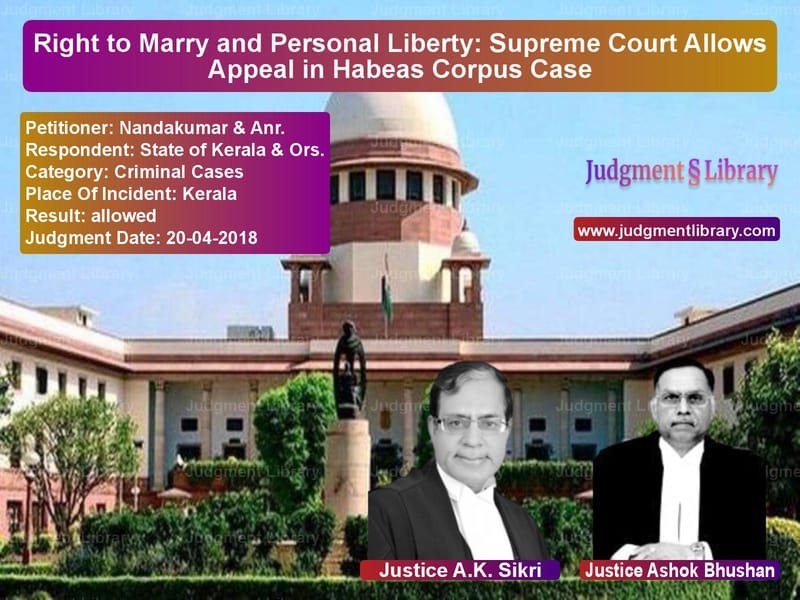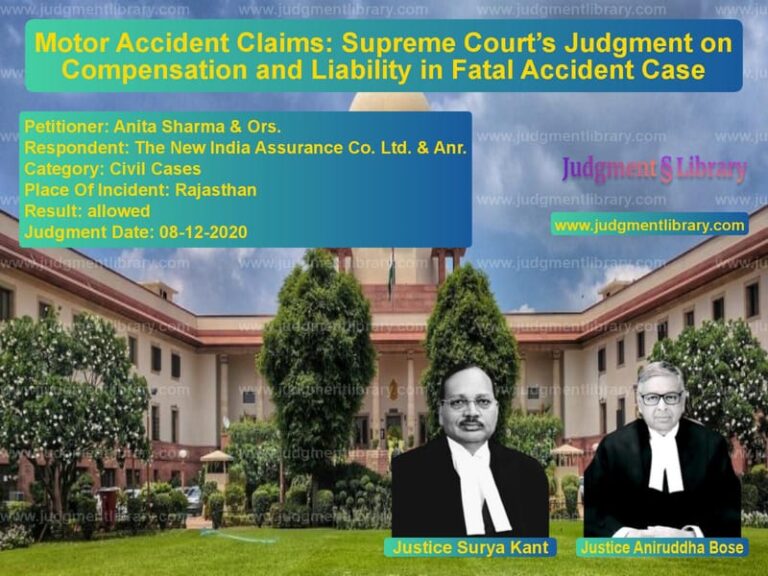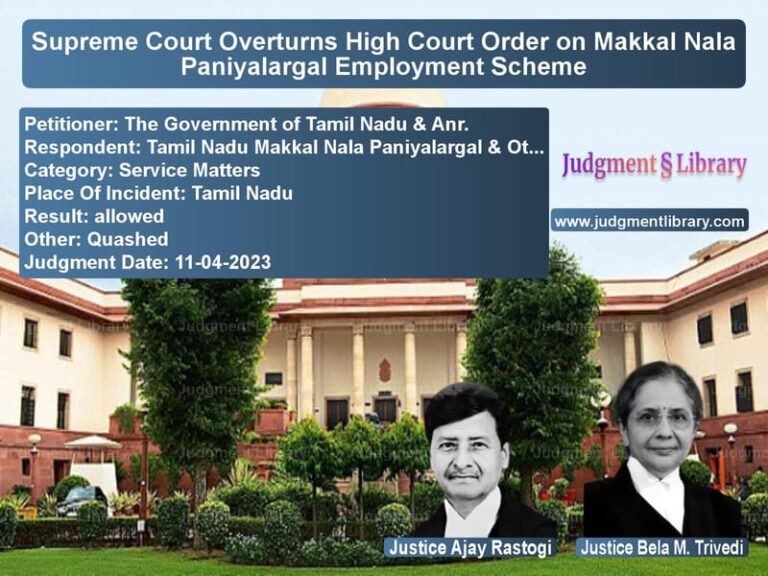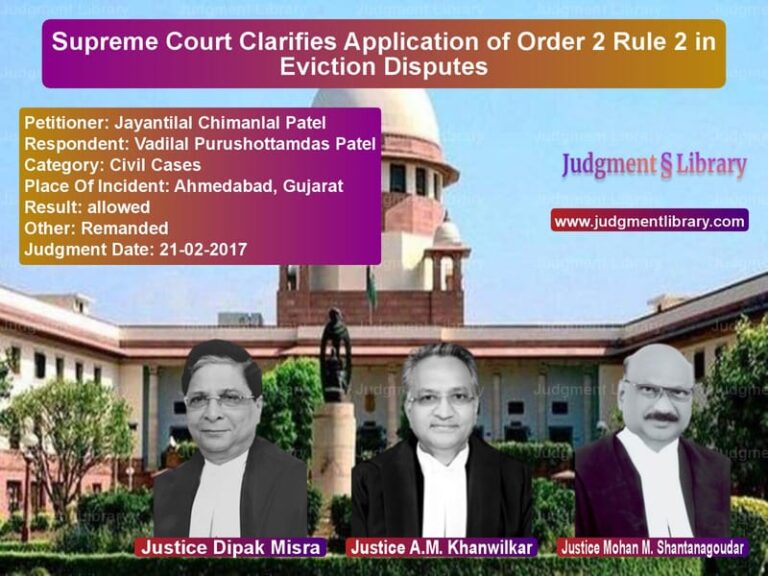Right to Marry and Personal Liberty: Supreme Court Allows Appeal in Habeas Corpus Case
The case of Nandakumar & Anr. vs. The State of Kerala & Ors. revolves around the fundamental rights of adults to choose their partners and live freely without interference. The Supreme Court was called upon to determine whether a father could claim custody of his adult daughter through a writ of Habeas Corpus, despite her expressing her free will to live with her husband.
The case originated when the father of Ms. Thushara filed a Habeas Corpus petition in the Kerala High Court, alleging that his daughter was illegally detained by appellant No. 1, Nandakumar. However, Thushara, who was 19 years old, had voluntarily married Nandakumar and wished to stay with him. The High Court, citing the fact that Nandakumar was not 21 years old at the time of marriage, ruled that the marriage was invalid and granted custody of Thushara to her father. This decision was challenged in the Supreme Court.
Background of the Case
Thushara and Nandakumar had married on April 12, 2017, at a temple in Kerala. However, her father, claiming she was missing, filed a police complaint on April 10, 2017, even before the marriage took place. Based on this complaint, the police conducted an investigation and traced Thushara, producing her before the High Court. Despite Thushara’s assertion that she willingly married Nandakumar and wanted to live with him, the High Court ruled that Nandakumar was under 21 years old at the time of marriage, making the marriage void. The Court then directed that custody of Thushara be handed over to her father.
Arguments by the Parties
Petitioners’ Arguments (Nandakumar & Thushara)
The appellants contended that:
- Thushara was an adult, and as per Articles 19 and 21 of the Constitution, she had the fundamental right to choose her partner and live wherever she wished.
- The High Court had no authority to determine the validity of the marriage in a Habeas Corpus petition.
- Even if Nandakumar was under 21 years old, the marriage was not void under the Hindu Marriage Act, 1955. At most, it was voidable and could be annulled only through proper legal proceedings.
- Live-in relationships are legally recognized under the Protection of Women from Domestic Violence Act, 2005, reinforcing the right of consenting adults to cohabit.
Respondents’ Arguments (Father & State of Kerala)
The respondents argued that:
- Since Nandakumar was not 21 years old, the marriage was invalid, and Thushara could not be considered his legally wedded wife.
- The father, as her guardian, had the right to take her custody and ensure her well-being.
- The High Court acted within its powers in ensuring the custody of the daughter was with her lawful guardian.
Supreme Court’s Analysis
The Supreme Court observed that the High Court had made an error by deciding the validity of the marriage in a Habeas Corpus petition. The fundamental issue in such a petition is whether a person is being illegally detained. Since Thushara, an adult, had chosen to live with Nandakumar of her own free will, the High Court’s order handing over her custody to her father violated her fundamental rights.
- The Court held that even if the marriage was voidable, it did not justify restraining an adult’s liberty or returning her to parental custody.
- The right of an adult to choose their partner is enshrined under the Constitution, and this choice must be respected.
- The Court emphasized that Thushara was not illegally detained and had the autonomy to decide where and with whom she wanted to live.
Key Observations by the Court
The Supreme Court ruled:
“Even if they were not competent to enter into wedlock (which position itself is disputed), they have a right to live together even outside wedlock. It would not be out of place to mention that ‘live-in relationship’ is now recognized by the Legislature itself which has found its place under the provisions of the Protection of Women from Domestic Violence Act, 2005.”
The Court further stated:
“Once a person becomes a major, he or she can marry whoever they like. If the parents do not approve of the marriage, they can cut off social relations with the person, but they cannot force an adult to live under parental custody.”
Final Judgment
The Supreme Court set aside the High Court’s ruling and allowed the appeal. It directed that Thushara’s freedom of choice should be respected and that she was free to live with whoever she wanted.
“We allow this appeal and set aside the impugned judgment of the High Court. However, since Thushara has not appeared as she was not made a party in these proceedings, while setting aside the directions of the High Court entrusting the custody of Thushara to respondent No. 4, we make it clear that the freedom of choice would be of Thushara as to with whom she wants to live.”
Conclusion
This judgment is a significant reaffirmation of individual liberty, emphasizing that adults have the right to choose their partners without interference from the state or family. The ruling reinforces that parental control cannot override constitutional rights, particularly in matters of marriage and personal autonomy.
Petitioner Name: Nandakumar & Anr..Respondent Name: State of Kerala & Ors..Judgment By: Justice A.K. Sikri, Justice Ashok Bhushan.Place Of Incident: Kerala.Judgment Date: 20-04-2018.
Don’t miss out on the full details! Download the complete judgment in PDF format below and gain valuable insights instantly!
Download Judgment: Nandakumar & Anr. vs State of Kerala & Or Supreme Court of India Judgment Dated 20-04-2018.pdf
Direct Downlaod Judgment: Direct downlaod this Judgment
See all petitions in Bail and Anticipatory Bail
See all petitions in Fundamental Rights
See all petitions in Constitution Interpretation
See all petitions in Judgment by A.K. Sikri
See all petitions in Judgment by Ashok Bhushan
See all petitions in allowed
See all petitions in supreme court of India judgments April 2018
See all petitions in 2018 judgments
See all posts in Criminal Cases Category
See all allowed petitions in Criminal Cases Category
See all Dismissed petitions in Criminal Cases Category
See all partially allowed petitions in Criminal Cases Category







